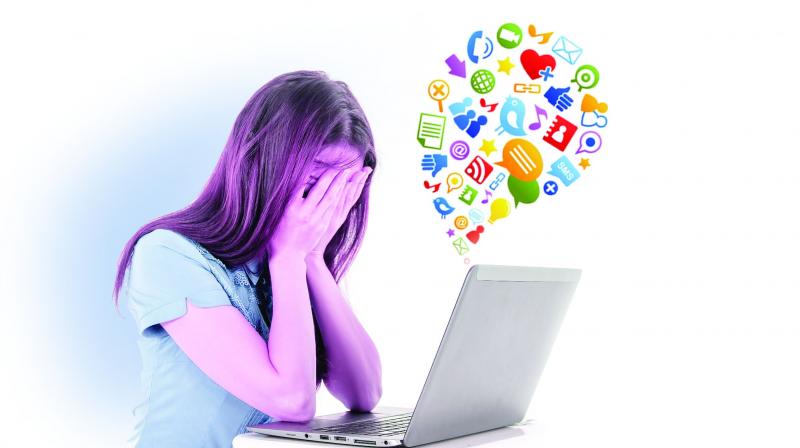Social media related depression
Addiction to social media often leads to personality disorders, inferiority complex and extreme depression.

Do you feel jealous when you see your peers post pictures of their “good things in life” on social media? Are you depressed that you “have nothing to boast about” even once in a while? Is it causing anxiety that you are still struggling?
This social stress is leading to anxious personality disorder, inferiority complex and extreme depression in a section of people who find it very difficult to handle these daily inputs. Constant bombardment of others’ success stories makes a section of people sensitive to negative comments and they tend to get irritated faster.
Even a question like “What are you up to these days?” comes across as a taunt to them.
Boasts by peers lead to depression
In clinical set-up it has been found that those who are busy updating their status on social media are actually very lonely. This medium becomes a tool for them to reach out to people without actually having to be physically present. But at the same time, they lose “real friends”, their real-life interaction skills with others get affected and their sympathy and empathy towards situations becomes more mechanical.
Dr Minhaj Nasirabadi, consultant psychiatrist at Apollo Hos-pitals said, “In social media groups it has been found that there are many people who are suffering silently as they have very little to put across as “extremely good”. The average person in the group has very little to boast about but these continuous posts can trigger a wave of social stress in them. They feel vulnerable as the feeling dawns that all people are doing well whereas I am left out. These triggers lead to severe mood swings, anxiety and depression.”
Feeling the pinch of withdrawal
Over-reliance of what is happening online is leading to “existential crisis” in a section of people. The usage of social networking sites has increased from seven per cent in 2005 to 65 per cent in 2015. A massive increase of usage, as high as 84 per cent, is seen in the age-group of 18 to 29.
Dr K. Srinivas, consultant neuro-psychiatrist at Maxcure Hospitals said, “Studies have found that those who checked social media frequently during the week had 2.7 times likelihood of depression than those who checked less frequently; 45 per cent of adults indicated that they feel worried or unconformable when they can’t access their email or social network sites.”
A connection between increased social media usage and deterioration of mental health has been indicated in research showing that it is one of the triggers for extreme depression episodes.
Online vs real personality
Eighty per cent of people spend time on Internet checking updates rather than doing any productive work. Those addicted spend maximum time in chat rooms and reciprocate “likes”.
Dr Aftab Ali Khan, consultant psychiatrist at Global Hospitals said, “Most addicts are found to have a different personality on social media than in real life. Many of them who are overtly active on social media come across as flamboyant, dashing and fearless. But in real life they suffer from poor social skills and some of them are also found to suffer from poorer physical health.”
He adds, “It is when there is an urgent need to convince someone that the problems begin and that’s where the addiction shows the weaker side of the individual. Pre-sent cases coming to the clinics are extreme ones wherein the addiction began as a pastime and was uncontrollable. There is a strong need to spread awareness about its harmful effects and also measures which must be exercised to help sufferers.”
Key indications
1. Imbalance between virtual and real-time relationships leading to issues.
2. Social media related conflicts are leading to negative relationship outcomes.
3. Young adults engaging in short-term romantic relationships.
4. Compulsive users reporting greater conflict with their partners, feeling of exclusion and concealment in addition to lower commitment, feelings of intimacy and less disclosure.
5. Users exhibit narcissistic tendencies.
What you must do!
1. It is very important to strike a balance by encouraging positive use while redirecting oneself from problematic use.
2. Those who undergo social stress must step out and check and re-check a real vs virtual situation.
3. Parents have to talk to their children about healthy social media habits and balancing their time between social media and real life issues.

